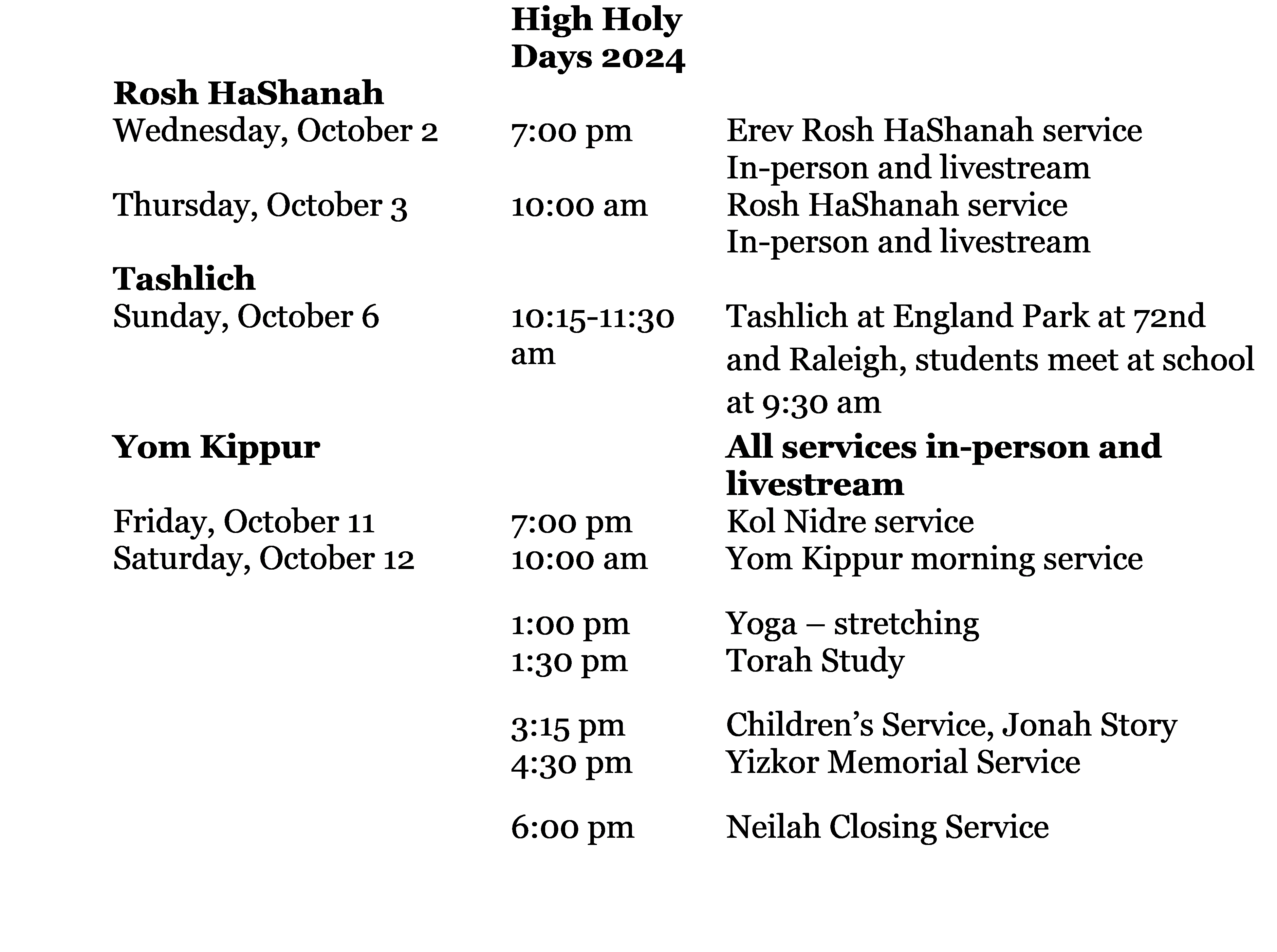Our congregation does not charge for attending High Holy Days services or any other services. It is one of the things that sets us apart from other congregations in the area. It is our belief that celebrating the holidays is an important aspect of the Jewish faith and the High Holy Days are no exception.
While donations are always welcome, and are greatly appreciated, Rosh Hashanah and Yom Kippur services are free and open to the public.

Rosh Hashanah
Rosh Hashanah is celebrated on the first day of the Hebrew month of Tishrei (the seventh month of the Hebrew calendar) which, because of differences in the solar and lunar calendar, corresponds to September or October on the secular calendar. Rosh Hashanah starts at sun down and begins a ten-day period leading up to the holiest day of the Jewish calendar, Yom Kippur, the Day of Atonement. During Rosh Hashanah, Jews from all over the world celebrate God’s creation of the world, attend synagogue and refrain from work these days. One of the most significant rituals during Rosh Hashanah is the blowing of the Shofar, or ram’s horn. It is used as a call to repentance during the High Holy Days.
A common greeting for Jews just before and during Rosh Hashanah is “May your name be inscribed (in the book of life).” Another popular greeting is “L’shana Tova”, which is a wish for a good new year. Traditional foods on Rosh Hashanah are sweet things. So apples dipped in honey and many other sweet dishes made with apples, honey, raisins, figs, sweetened carrots, and pomegranates are generally served in the Jewish home. The traditional challah bread is made sweeter and shaped in a circle, symbolizing completeness and never-ending sweetness. The rabbinic idea of this “sweetness” was to bring a sense of optimism to the festival, since the themes of repentance and atonement might have made this season a somber time of remorse alone.
At B’nai Torah, the community comes together on this joyous holiday to reflect on the past year and to celebrate the hope of the new year. We celebrate the new year with our annual Honey Cake Contest, taking place on Erev Rosh Hashanah. Our contest is always a big hit and new cakes are encouraged and welcomed. Tashlich is done as a community at a nearby creek, usually on the Sunday after Rosh Hashanah. Our board-sponsored luncheon welcomes all and concludes our holiday observance.
Yom Kippur
Yom Kippur (Day of Atonement) is celebrated on the 10th day of the Hebrew month of Tishrei. Ten days after the start of Rosh Hashanah, we celebrate this meaningful holiday. It is the culmination of the Yamim Noraim (Days of Awe); ten days in which we have had an opportunity to review both our good deeds and our missteps over the past year. Yom Kippur, especially, is a day to separate ourselves as completely as possible from our day to day lives and focus our energy in a spiritual direction. Instead of satisfying our physical needs with food, drink, pleasure, and adornment, it is a day in which we can devote our heart, soul, and mind to our relationship with the Divine. We come together as a community to confess our sins. “While each individual may not have committed these specific sins, as a community we surely have, and our fates are intertwined on this day.” (MLS Staff – myjewishlearning.com)
Customary greetings for Yom Kippur are “G’mar Hatima Tova” (May you be sealed in the Book of Life) or a shorter version “G’mar Tov”. Additionally, one might say “Have an easy fast” before the holiday starts.
At B’nai Torah, we typically begin our celebration on Erev Yom Kippur with a Kol Nidre (Aramaic for ‘all vows’) service. On Yom Kippur day we have a morning service followed by a text study or meditation period around 11:30am. Later in the afternoon we have a family service that always includes an interactive reading of the tale of Jonah and the Whale. It’s a community favorite! Yom Kippur evening includes a Yizkor service (a prayer service in memory of those who have passed ), and then at nightfall our Neilah service allows us to make our final pleas and hear the sounding of the Shofar. We end the evening with a light “Break the fast” meal.
Visitors are welcome at no charge.


